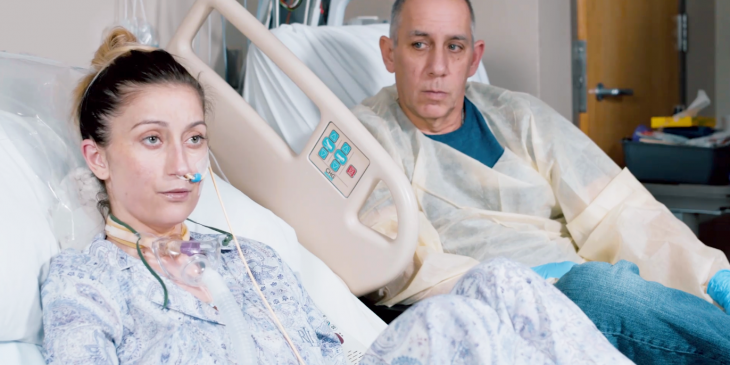Jenna Simonetti didn’t want a double lung transplant.
When the Rochester, New York, native was recommended for the surgery due to the deteriorating state of her health because of cystic fibrosis (CF), she just wasn’t mentally ready.
“To me, a transplant was a major operation,” said Simonetti, 29. “I just wanted to try to focus on getting my lungs back into shape without it.”
Simonetti did realize, however, that she was an anomaly among CF patients when it came to her view of transplantation. From what she could tell, most patients with CF would jump at the chance to receive a healthy set of lungs and a potential fresh start.
“I follow a lot of CF patients on social media, and I notice that they always can’t wait to get a transplant,” Simonetti said. “No one ever seems to be hesitant when they’re constantly posting things like, ‘I just want to be on the transplant list,’ ‘I need a transplant,’ ‘I am ready for my transplant.’
“As sick as I was, I was so not ready. I was terrified.”
Simonetti was diagnosed with CF when she was 6 years old, but never let it stop her from living.
“I played soccer every day of my life,” she said. “I played other sports and rode horses, too. You would never even have known I had cystic fibrosis.”
At 12 years old, Simonetti was diagnosed with a specific type of bacteria CF patients are susceptible to known as Burkholderia cepacia. She was now deemed a “high risk” CF patient, as the antibiotic resistant bacteria is known to be deadly.
As years went by, the fight against her illness became an uphill battle, and her lung function began to worsen.
“As you get older, your lungs deteriorate more, and that’s when you begin to see the nastier effects of CF,” Simonetti said.
In 2015, constant headaches due to an increase in her carbon dioxide levels forced her to be placed on portable oxygen.
“Jenna has been chronically ill for most of her life — it’s just remarkable how she had to live prior to the transplant,” said Dr. Jonathan D’Cunha, chief of lung transplantation at UPMC. “Most patients with CF don’t get to live a normal childhood. They are constantly linked to doctors and their disease. It owns their lives.”
Simonetti was recommended to UPMC for a double lung transplant, but declined the offer, and returned home to try to restore her health without surgery.
One day while taking a nap, her oxygen mask accidentally slid off her face, causing her oxygen levels to drop significantly. When she awoke, her family noticed that she was disoriented, and they called 911.
Simonetti was airlifted to UPMC and immediately place on the lung transplant waitlist.
“My family was so worried about me, they ended up taking me to a local hospital I wouldn’t normally go to just because it was closer,” she said, thinking back on the terrifying moment she was barely conscious for. “That’s when I was the most afraid. That was my reality check.”
Since the program’s inception in 1982, UPMC’s lung transplant program has performed over 2,000 lung transplants, all while maintaining successful outcomes.
While waiting for the transplant, Simonetti had two “dry runs,” a common occurrence during the transplant process when lungs that could be a match are secured but end up not being healthy enough or a close enough match.
“You get all ready and prepared for surgery just for them to tell you that it isn’t going to happen,” she said. “But in a way, it’s a blessing because it proves the doctors don’t just pick out random lungs — they are willing to wait to find the perfect ones.”
On the day before Thanksgiving, Simonetti and her family had a lot to be thankful for — they found lungs, and they were a perfect match. The successful surgery was performed Thanksgiving morning.
We fully expect her to do well from here on out,” D’Cunha said. “There is always the battle with possible rejection, but that is part of the transplant recovery process.”
And, while she was apprehensive about getting the transplant at first, Simonetti now looks back at her experience in a positive light thanks to the staff at UPMC.
“You really have to be able trust your doctors and nurses,” she said. “They’re the ones who made this experience bearable.”
Simonetti is no longer on oxygen, and recently tested negative for organ rejection and cepacia. She is on track to return home to Rochester within the next few months.
Sometimes, she can’t even fathom how far she has come in her CF journey.
“I don’t even think it’s fully hit me yet,” she said. “I went from being the girl who couldn’t chew her food without being out of breath to being able to actually walk around and cook meals for myself and my dad. It wasn’t easy, but it was so worth it.”









